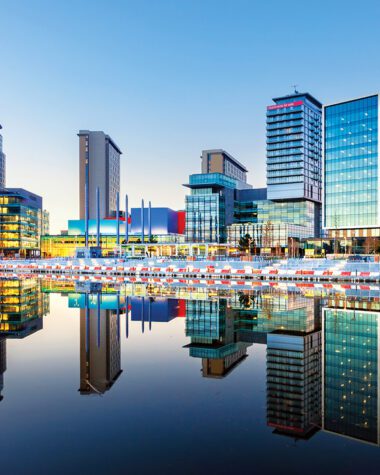Almost all, 99%, of commercial property stakeholders affirm that complying with current building standards is essential to protecting properties against climate risks, and more than half, 53%, are willing to spend $20,000 or more to increase resilience, according to the Agency Forward survey from Nationwide.
“Nationwide has and will continue to raise awareness and advocate for the adoption of modernized building codes and resilient infrastructure. As a founding member of the Insurance Institute for Business and Home Safety (IBHS), we believe strong, enforceable building codes are the simplest, most effective way to better protect our communities, save lives, reduce property damage and lessen the burden for post-catastrophe aid,” writes Mark Berven, president and COO of Nationwide’s property and casualty business, in an email interview with Digital Insurance.
Of the property owners, new construction builders and business owners surveyed, nearly two-thirds, 65%, conveyed concerns about outdated building standards, and 84% agree that improved building codes are necessary to protect their properties.
The survey reports that 36% of property stakeholders, with 59% in hurricane-risk states, have experienced a weather event and suffered from related damage within the past five years. Of these respondents, almost half, 49%, said that their recovery took between four to six months and cost them between $20,000 and $50,000.
“Modernized standards, such as IBHS’s Fortified construction standards, will better account for today’s climate risks and minimize the risk of storm damage to businesses. To share a residential example, of the 17,000 homes in Alabama that were affected by Hurricane Sally in 2020, 95% had little-to-no damage thanks to the Fortified roofs they received with help from the Strengthen Alabama Homes program,” writes Berven. “It’s time to provide this enhanced safety and resiliency to communities across the U.S., but it will take teamwork. Building codes mostly fall under the purview of state and local governments, so it will require involvement from carriers, trade associations and insurance agents to lead these efforts at the national and local levels.”
Employing technology and innovative solutions can also play an important role in building property climate resilience.
Research from Economist Impact’s “Resilient Cities Index” shows that cities that use digital technologies and data analytics to predict risks and losses, improve efficiencies in existing operational systems and share information with the public are better equipped to deal with shocks.
The index notes that poor internet quality can lead to issues with accessing digital services, which decreases the overall resilience score in critical infrastructure. Increased risk associated with digitalization is also a concern, though the report explains that most cities in the Economist Impact’s index have built safeguards against such risk.
“As the industry leans into its central purpose of protection, it also requires that we shift our mindset to predicting and preventing losses before they happen. Technology plays an important role in enabling that shift. Nationwide partners closely with the IBHS…” explains Berven. “We’re also investing in companies like Mitiga Solutions that combine scientific models with technology to give the insurance industry a better understanding of when and where bad weather will strike so we can be better prepared to withstand it. Additionally, our partnerships with smart technology companies like Resideo Technologies will help to leverage commonly used smart home technology to continuously predict and prevent losses in homes and give homeowners greater peace of mind.”







